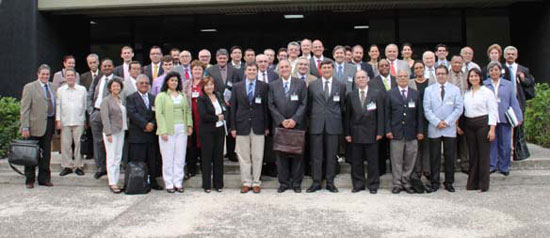Latin American and Caribbean Countries Agree to Forge Closer Collaboration in order to Improve Use of Statistics
Work area(s)
They called for increased use of national data in human development reports, and highlighted progress in the code of good practice for statistics.

(8 April 2011) The Member States of the Economic Commission for Latin America and the Caribbean (ECLAC) agreed to forge closer cooperation in order to improve the use of national data and figures in the reports of international agencies, at the end of the Tenth Meeting of the Executive Committee of the Statistical Conference of the Americas (SCA-ECLAC), in Havana, Cuba.
In particular, they underlined the need to ensure that Member States of the Conference were consulted as part of the drafting of the Human Development Report of the United Nations Development Programme (UNDP), and pointed out the importance of using national statistics and data in this report.
With this in mind, they set up a group of experts made up of representatives from Brazil, Canada, Colombia, Costa Rica, Cuba and the Dominican Republic to carry out technical consultations with the UNDP Office for the Human Development Report. The group will report on the results of its activities at the sixth Statistical Conference of the Americas, scheduled to be held in November 2011 in the Dominican Republic.
They also emphasized the progress made in drafting the code of good practice for statistics in Latin America and the Caribbean, and called on the region's countries to provide the necessary resources for the proper completion of population and housing censuses, to facilitate timely access to census data and to promote the appropriate use, analysis and disclosure of this information.
In the current 2010 round of censuses, Argentina, Aruba, Bahamas, Barbados, Belize, Brazil, Ecuador, British Virgin Islands, Mexico, Panama, Dominican Republic and Saint Lucia have already carried out their respective population and housing censuses.
Within the various working groups of the ECLAC Statistical Conference of the Americas, the members of the Executive Committee described activities carried out to promote institutional coordination in countries, the reduction in statistical discrepancies and the availability of increased and improved information on follow-up to the United Nations Millennium Development Goals (MDGs).
In this context, they underscored the need for international agencies to prioritize the use of statistics that are officially generated by countries for MDG follow-up, provided that they meet the required quality and comparability standards.
They also welcomed the creation of the United Nations Entity for Gender Equality and the Empowerment of Women (UN Women), and reiterated their commitment to improving gender statistics.
In the framework of the sixth meeting of the ECLAC Statistical Conference of the Americas to be held in November, they agreed to recommend the organization of three seminars on the following topics: a) 2010 round of population censuses: quality and technological innovations; b) current and future challenges for the development of national statistical systems in the region; and c) environmental statistics.
More information on the Tenth Meeting of the Executive Committee of the SCA-ECLAC is available online.
Any queries should be addressed to the ECLAC Public Information and Web Services Section.
E-mail: dpisantiago@cepal.org; telephone: (56 2) 210 2040.
Country(ies)
- Brazil
- Canada
- Colombia
- Costa Rica
- Cuba
- Dominican Republic
